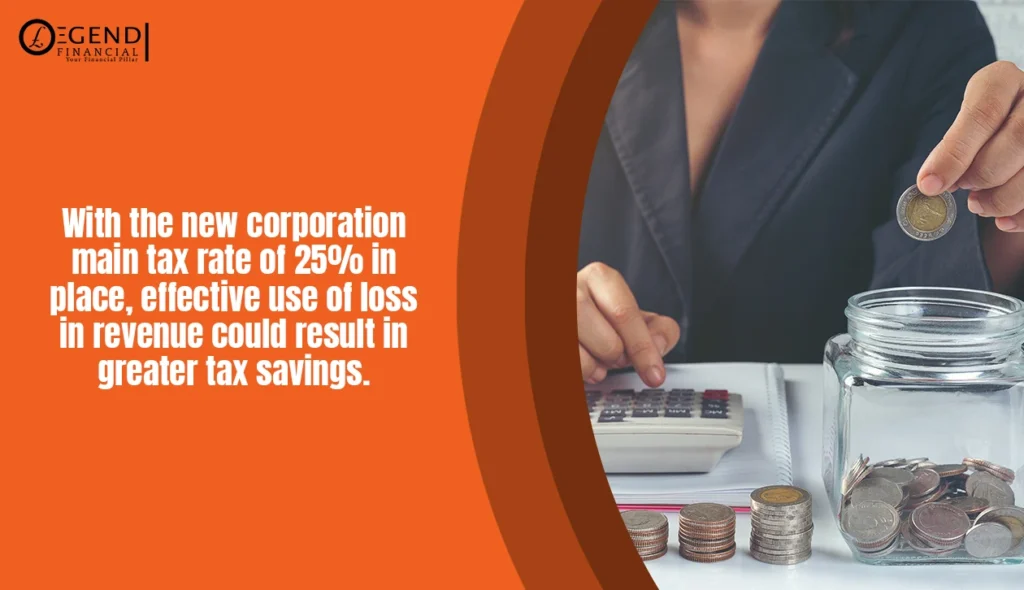Contents
Every business encounters losses at some point, but how you tackle them makes all the difference. HMRC offers UK companies relief on corporation tax on losses. Understanding how you can legally leverage this relief can help improve your financial standing. Read on.
Corporation Tax [2025]: A Quick Guide
Corporation tax rates in the 2024/25 tax year are still at 25% for main rate and 19% for small profits. This tax applies to various incomes of a business, such as:
- Trading Profits
- Investment Income
- Chargeable Gains
Usually, the payment deadline for corporation tax is nine months and one day after the end of the accounting period but the tax returns are to be filed within 12 months after the end of accounting period.
When Does a Trading Loss Happen?
Trading losses happen when your business income is less than the allowable expenses. These losses from your trading profits, property business income, or sales of capital assets within an accounting period can be claimed tax reliefs through corporation tax return, resulting in a reduced corporation.
Trading losses can either indicate a deep-rooted financial issue within your company or can be due to temporary reasons such as economic downturns, seasonal changes, or unexpected costs.
Factors contributing to trading losses include:
- High Operational Costs: When expenses such as rents, salaries, and utilities are higher than revenue, your business may struggle to maintain profitability and eventually operate at a loss.
- Decline in Sales Revenue: When the market demands decline due to high competition, changes in the market and consumer behaviour lead to lower sales figures and, eventually, a significant dip in income.
- Bad Debt Write-offs: When consumers fail to clear outstanding dues, you write them off as bad debt. Bad debt adds to trading losses and decreases revenue. Take note that writing off debt as a loss does not make your debtor unaccountable to repay you.
- Stock Valuation Methods: Inventory valuation directly impacts declared gains. In an inflationary market, the First-In-First-Out (FIFO) method results in a greater tax burden, as reported taxable income is higher. Whereas the Last-In-First-Out (LIFO) method results in reduced tax liability as reported taxable income or losses are lower.
- Loan & Interest Expenses: Business funded with loans often have greater interest debts. If your interest exceeds your revenue, your business struggles to cope with debts, resulting in trade losses.
- Assets Depreciation: Capital assets items such as property, equipment, or machinery leads to significant depreciation. This adds to your business’s accounting records as a trading loss even with a positive cash flow.
Do You Still Pay Corporation Tax on Losses?
When your business incurs losses, you usually do not pay UK corporation tax on them. However, you still need to file your tax returns as HMRC offers relief to counter losses against past or future profits, which can significantly cut or minimise your tax liabilities.
In the UK, claiming relief against taxable gains enhances liquidity. Hence, you must report your losses accurately to claim relevant reliefs whilst staying compliant.
Businesses, whether big or small, owned by groups or individuals within or outside the UK, can claim relief against their total profits for the same accounting period or the previous 12-month period or more. Those on extended relief or groups will be capped at a certain time limit.
Even if a company shuts down its operations, it can still claim trading loss reliefs through terminal loss relief, discussed more below. HMRC will first assess all evidence submitted by the claiming companies, which includes information from their accounting records or management accounts.
Check relevant article: Does A Sole Trader Pay Corporation Tax?
Types of Loss Reliefs and How to Claim
When managing complex corporation taxes, understanding how loss reliefs work is critical as they can significantly reduce your corporation tax liability. Trading losses can be claimed whilst you are filing your corporation tax returns.
Making the best use of trading losses corporation tax can effectively help you recover from financial setbacks and optimise future tax position.
Current Year Relief
The current year’s relief helps minimise tax liability on taxable income, a strategy specifically beneficial to businesses used as secondary income sources, such as real estate management or freelancing, as the losses within the accounting period can be immediately claimed.
Carry-Back Relief
Businesses often claim relief to lower the taxes they must pay on the profits from the past 12 months, irrespective of being in the current accounting period. This way, they can minimise their taxable income whilst receiving potential corporation tax refunds during a rough year.
Note that the temporary extension allowing losses to be carried back up to three years has ended.

- Carry-Forward Relief
Another way is to have your corporation tax losses carried forward, especially when you expect to earn higher profits in the upcoming accounting year.
Let’s say a major customer makes a bulk order that will be paid for in the future. Rather than reporting the losses immediately, you can save them for the next fiscal year to offset greater taxable income.
- Group Relief
Businesses registered as corporate groups can effectively reduce overall tax liability by offsetting trading losses between the parent company and its sister firms, without carrying back or carrying forward the losses.
For tax purposes, HMRC does not consider a group of companies as a single entity. But allows them to share their trading loss amongst themselves. Therefore, the one giving up losses becomes the surrendering company and the one claiming those losses becomes the claimant company.
Group relief is a valuable tool for corporate groups to maximise tax efficiency as it applies to investment income, and capital losses.
- Terminal Loss
You can recover a portion of profits you lost through corporation tax on losses 2024/25 or other tax years by claiming terminal loss relief. This applies when your company is forced to shut down after suffering trading losses.
Terminal loss minimises the tax burden by allowing the business to carry back its losses from the last 12 months and offsetting them against the profits of the preceding three years.
Beware of Using Losses to Evade Tax
The anti-tax avoidance rule in the UK prevents businesses from evading their tax liabilities. This rule ensures that companies do not claim corporation tax refund on losses particularly for their own gain.
With this policy in place, HMRC can challenge transactions that gives a hint of tax evasion, even if they technically comply with regulations. This includes practices such as moving profits to low-tax jurisdictions, inflating deductions, and manipulating tax loopholes illegally.
If found guilty, HMRC imposes fines and penalties to ensure the company pays a fair tax rate according to the actual profit gains without manipulation.
There are legal means you can use tax loopholes in the UK. Check out this blog: Tax Loopholes for the Middle Class in the UK.
Proactive Tips to Prevent Future Losses
To avert future losses, companies must persistently analyse their financial records, administer overheads, whilst diversifying revenue streams. Profitability and customer retention can be enhanced by cost control, and technologically optimising operations.
To ensure future financial stability, you must reserve an emergency fund in the form of dividend payouts, or capital gains tax.
FAQs on Corporation Tax on Losses
How many years can corporation tax losses be carried forward?
3 years up to the period when you suffered the loss.
Can Limited Liability Partnerships claim relief through corporation tax?
No, Limited Liability Partnerships (LLPs) do not pay corporation tax. Rather, gains and losses are shifted to partners, and they claim via income tax.
Does depreciation reduce corporation tax?
No, depreciation does not reduce corporation tax under 2024/25 tax regulations. Instead, capital allowances on qualifying assets can be claimed as a tax-deductible alternative to depreciation.
Do companies pay corporation tax on dividends?
No, corporations do not pay corporation tax on dividends. Shareholders receive dividends and may be subjected to dividend tax, as per their total income.
Can you pay corporation tax in installments?
Yes, as per HMRC, large companies must pay corporation tax electronically in installments.
Get Expert Tax and Business Advice
For financial stability, companies can claim relief on losses by carrying forward, carrying backward, or shifting within a group, as it is crucial to effectively manage corporation tax on losses to improve cash flow with reduced tax liability. Our tax experts at Legend Financial will help you optimise your tax strategy and maximise tax reliefs, whilst ensuring compliance with HMRC.



![Corporation Tax on Losses: Reduce Your Tax Burden [2025]](https://legendfinancial.co.uk/wp-content/uploads/2025/02/LF-Blog-20-Corporation-Tax-on-Losses-ft-1024x618.webp)







